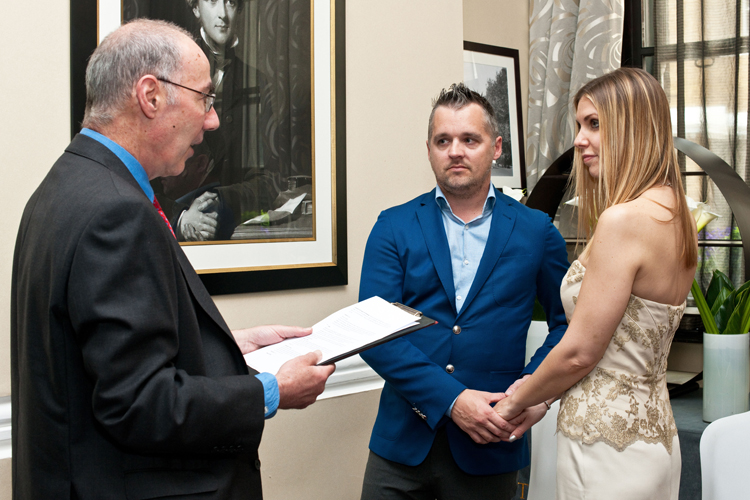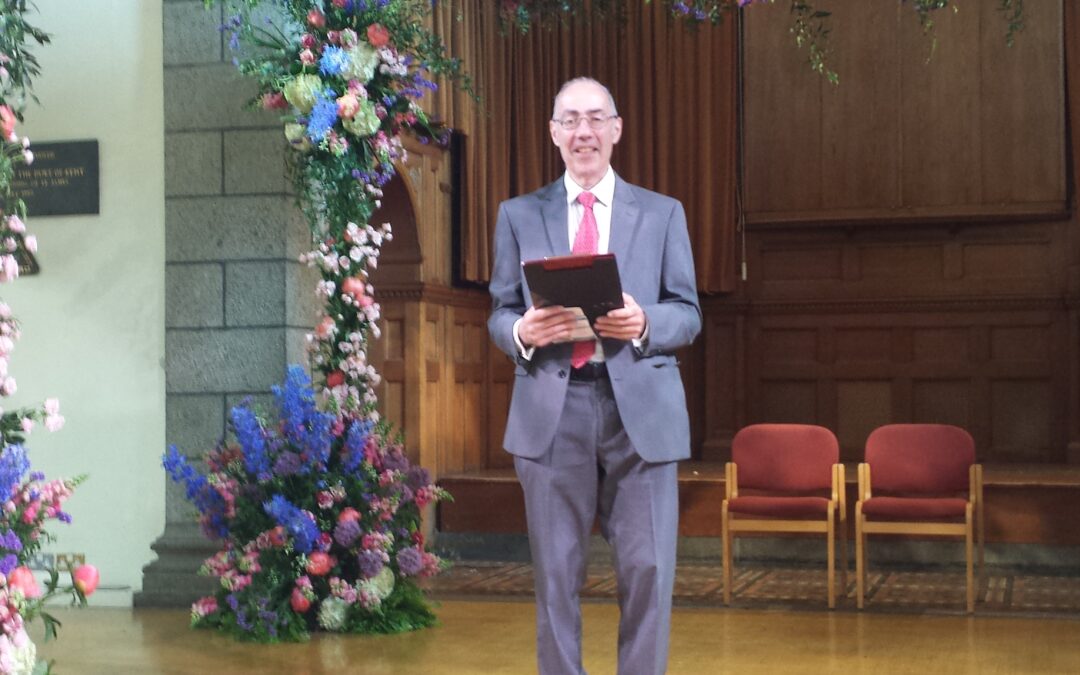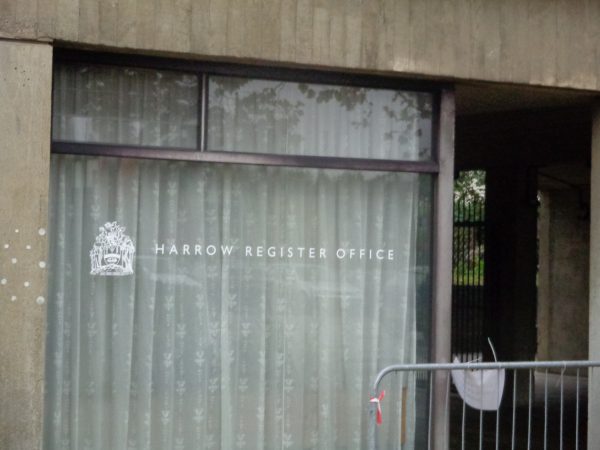
by Michael | Aug 9, 2021 | Blog
No, no! Not “when you’re totally tanked up with booze”!
What I’m actually referring to is the most advantageous time, day and type of ceremony for you.
Of course, your hands may be tied, depending on the type of ceremony you have in mind and the venue.
Register Office
If you choose to marry at a Register Office, you need to make an appointment and go down (with two witnesses) on a working day.
At the time of writing, most (if not all) registrars conduct the ceremony from their base, rather than attending a licensed venue. (If they come out, there require certain criteria to be met, such as venue specifics and timings. They also charge quite a lot for this service.)
A bill is going through Parliament (slowly!) that may allow certain celebrants to conduct legally-binding weddings, which may obviate the need to involve the registrars.
Which brings me on to your next possible choice.
Less Conventional Ceremonies
If you want a unique, tailor-made service, then, once your marriage has been made legal by the Registrars, you can use an independent celebrant. Such a ceremony can take place at the venue of your choice, be it a hotel, an iron age fort, a canalside, or wherever (subject to permission). It can also take the form of your choice (eg personalised), which is where the celebrant comes in.
When to Marry
As a rule of thumb, you may be able to make savings, if you avoid high season. That may also suit your guests better. If you choose New Year’s Day, there might be problems for those travelling by public transport or indeed for those nursing hangovers!
Valentine’s Day makes sense at one level, but suppliers often raise their prices for such a day.
Summer is popular, but is not always the best bet. Apart from higher prices, weather (as we are seeing this year!) is not guaranteed, and you may be safer booking Spring or Autumn. If you leave it too late and you book for the Summer, you may find that many of your potential guests have already booked their holidays and can’t attend your wedding.
Destination weddings also need considerable notice for most guests.
Savings
It’s often worth discussing possible discounts with your supplier. The worst that can happen is that they refuse!
Possible bargaining levers are holding the wedding out of season (as mentioned), holding it in the morning or afternoon, and choosing a Monday through Thursday.
Conclusion
There’s plenty to think about, then, but I hope that these remarks shed some light, at least. You may need to be flexible and certainly need to do some research, but the results can be so worthwhile.
Never forget that it is your big day, and you should have what you want.
Do speak to me, if I can help you further.
Photo: Victor Shack

by Michael | Apr 20, 2021 | Blog
I’m often asked what is my role. How can I conduct a wedding? Surely, that’s got to be either a priest (or equivalent) or else the registrars?
What people often don’t realise is that those are not the only options.
As we’ll find out, there’s also a civil celebrant (like me!) who can do the job.
Religious
If you opt for a full religious service in England & Wales, then of course you go to your church (or equivalent). They will explain all that’s involved. Not every branch of Christianity is catered for here, though. Church of England, Quaker or Jewish are the only types of religion included.
For other sects, you can marry in a non-C of E church (say), but the marriage will not be legal until you have made an appointment and been to the Register Office. Without the registrars’ participation and the pronouncing of certain words, you will not qualify as legally wed.
Civil
If you choose the civil route, you need to know that the service must be totally non-religious. You can be sure that it will be a totally secular ceremony, even though the content may vary a bit from registrar to registrar.
The Register Office service will cost in the region of £100. Pre-COVID, they could come out to a venue licensed for weddings, albeit for another £500 or so. As I write, this is no longer possible, and, anyway, wedding numbers are still limited severely.
Celebrant
There is another option, however, which all too few people know about. It is particularly useful if:
- You may not want a full religious service
- You may want one, but are prevented from marrying in your church/synagogue etc. For example, you are a (Catholic) divorcee or yours is a mixed-faith ceremony
- You (or even your parents!) want to have just a smidgen of religion in your service
Note that, a humanist celebrant, like the registrars, will not allow any religious references. So go for an independent celebrant, and you can enjoy a personalised ceremony with as much or as little religion as you want.
Again, this is not a legal ceremony, so you still have to go to the registrars. Afterwards, you can enjoy the ceremony you actually want, compiled and conducted by your civil celebrant. It can be in the venue of your dreams, and, to all intents and purposes, be your actual wedding. It can reflect your personalities and beliefs, with inspiring spiritual – or even funny – readings, and contain personalised sections, such as self-written vows.
So don’t go thinking that your big day can’t be the way you want it! Because it can!
Have a chat with me, and I’ll show you how.

by Michael | Jan 4, 2021 | Blog
For most of us 2020 was a dismal year. A few people prospered, and good luck to them. Most of us suffered. Very often, it was health or financial issues. Or both.
More relevant to me, as a celebrant, brides and grooms (and suppliers!) had to put up with plans continually being changed or deferred. The worst thing for many people was simply not knowing. What would the next directive say? What asumptions could anybody make? Why book, when plans could be thrown into chaos the next day?
Of course, some people either gave up altogether or modified their plans drastically.
I lost two weddings to cancellations. In one case, it would have been in a fabulous Lisbon venue. That was postponed, but the venue had to change. It became the superb Palacio de Queluz, Sintra (google that, and just see what it looks like!)
Then the bride and groom found their businesses were struggling. No other choice, but to cancel the wedding. (They may still get married – at a register office, but that’s not quite the same …)
I belong to several Facebook groups where most brides are currently in distress and crying out for guidance.
As I write, there is much talk of another national lockdown – maybe, till after Easter. So do couples move the wedding till the summer, say? Can they book a decent venue at such short notice? Should they assume that they can’t invite more than 15? What sort of COVID precautions should be taken?
I have no more of a crystal ball than anyone else. But my advice is not to delay. At least, go and get married at the Register Office. Then wait.
Wait till we’re out of this and can make sensible decisions. Then organise a wedding service at a venue of your choosing. Book your civil celebrant, photographer and caterer. Even though you will already be legally married – enjoy the whole day with your friends and family as if it were the big day itself.
Then everyone can enjoy and relish the atmosphere of such a special occasion.
Give me a call, and we can start making plans!

by Michael | Nov 24, 2020 | Blog
Where you marry may depend on the current governement regulations. As they are unpredictable, perhaps I can leave them out of the equation.
The decision as to where you hold your wedding is likely to be vital. The atmosphere is going to matter to you both.
So where can you marry?
The obvious choices
- The answer is simple, if you go down the full religious route. You’ll marry in your religious building.
- Should you opt for a Register Office affair, it’s no less simple. You make an appointment to attend the office, with two witnesses, and that can be it.
There’s another choice
You don’t have to be bound by those two alternatives. You can opt for the civil celebrant route, and then it’s a potentially more rewarding ball-game.
You’ll still need to attend at the Register Office. That’s how you will get legally married first. (The legislation may be changing, but that’s for another day!) You’ll need to make an appointment before the ceremony (as above).
The difference is that now you can additionally have your personalised service. That’s where you stammp your personalities and beliefs on the occasion. Your civil celebrant will help you create this dream ceremony and then conduct it beautifully.
The ceremony can take place in the venue of your dreams,
And that means almost anywhere that your imagination (and COVID-19 regulations) allow! Indoors or outdoors (or even underwater!). It could be in your back garden or (with permission, of course) in a field next to a canal, up the Shard, at Stonehenge, by the seaside, in the Ritz Hotel, in a hot-air balloon … – well, you get the picture!
Advice
If you’re arranging the ceremony yourself, you’ll need a celebrant, and probably suppliers such as florists, photographers, make-up artists, caterers, etc.
You may want to hire a wedding planner. For the extra cost, you get peace of mind. Depending on the package you agree, every detail can be organised and overseen for you.
Regardless, you need to get permission and/or pay for the venue you may be using.
All this should be arranged well in advance – generally, at least a year ahead, as some of the suppliers get booked up quite early.
With all suppliers, try and get first-hand reports from people who have used them. This may be word-of-mouth or website reviews, but speaking to them directly is important. You can ask your questions and get a feel for the supplier’s attitude.
Practicalities
Remember good old health and safety – especially if you’re organising everything yourself. (No trailing wires; ensure there are sufficient toilets; check signposting etc. etc.)
The bottom line is that you really can choose where (and how) to mark your big day. Just remember to ensure you are COVID-19 compliant (whatever the current regulations may be).
Of course, if you need any advice on the ceremony, just contact your friendly neighbourhood celebrant!

by Michael | Sep 14, 2020 | Blog
Where you marry is not something to take for granted. If atmosphere is important to you, you’re going to select your venue with care. That applies to the venue of your wedding service and to the reception venue (if they are different).
When I married my good lady back in the sands of time, we attended the local register office, which was far from attractive! Knowing that, we had booked alternative venues for the other parts of the occasion. Those choices mattered to us.
The obvious choices
If you go down the full religious route, you’ll use your religious building. It’s simple enough.
It’s almost as simple if you’re having a Register Office wedding. You make an appointment to attend the office, with two witnesses. A quarter of an hour later, it’s all over. (Incidentally, pre-COVID, Registrars would come out to some venues – though at quite a price!)
Another choice
You don’t have to be bound by those two alternatives. You can opt for the civil celebrant route, and then it’s a different ball-game.
This doesn’t negate the Registrars. You still have to get legally married first. That means making an appointment before the ceremony (as above).
The difference is that now you can also have your personalised ceremony – in the venue of your dreams.
And that means almost anywhere! It could be in your back garden or (with permission, of course) in a field next to a canal, up the Shard, at Stonehenge, by the seaside, in the Savoy Hotel, in a hot-air balloon – well, you get the picture! Do bear in mind dear old social distancing!
Advice
If you’re arranging the ceremony yourself, you’ll need a celebrant, and probably suppliers such as florists, photographers, make-up artists, caterers, etc.
You may want to hire a wedding planner. For the extra cost, you get peace of mind. Depending on the package you agree, every detail can be organised and overseen for you.
Regardless, you need to get permission/pay for the venue you may be using.
All this should be arranged well in advance – generally, at least a year ahead, as some of the suppliers get booked up quite early. Maybe even earlier in the new world we’re living in.
With all suppliers, try and get first-hand reports from people who have used them. This may be word-of-mouth or website reviews, but speaking to them directly is important. You can ask your questions and get a feel for the supplier’s attitude.
Practicalities
Remember good old health and safety – especially if you’re organising everything yourself. (No trailing wires; ensure there are sufficient toilets; check signposting, observe social distancing etc. etc.)
The bottom line is that you really can choose where (and how) to mark your big day. Of course, if you need any advice on the ceremony, just contact your friendly neighbourhood celebrant!





